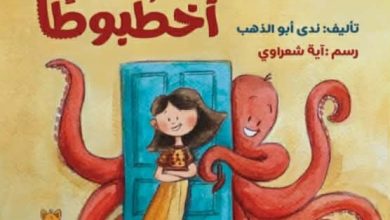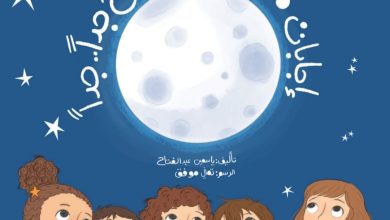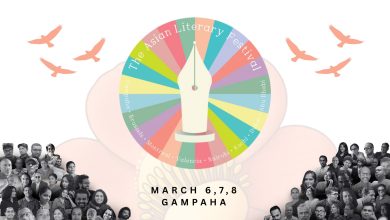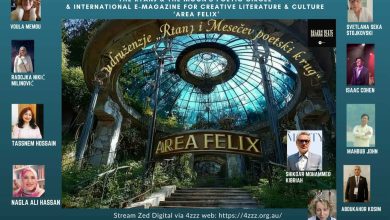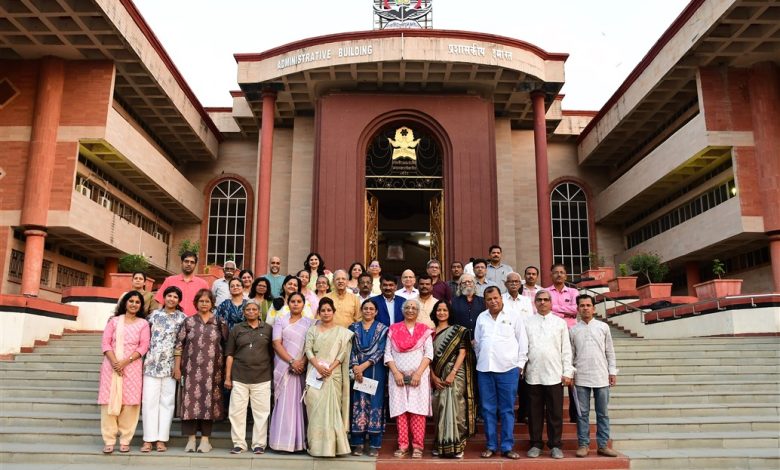
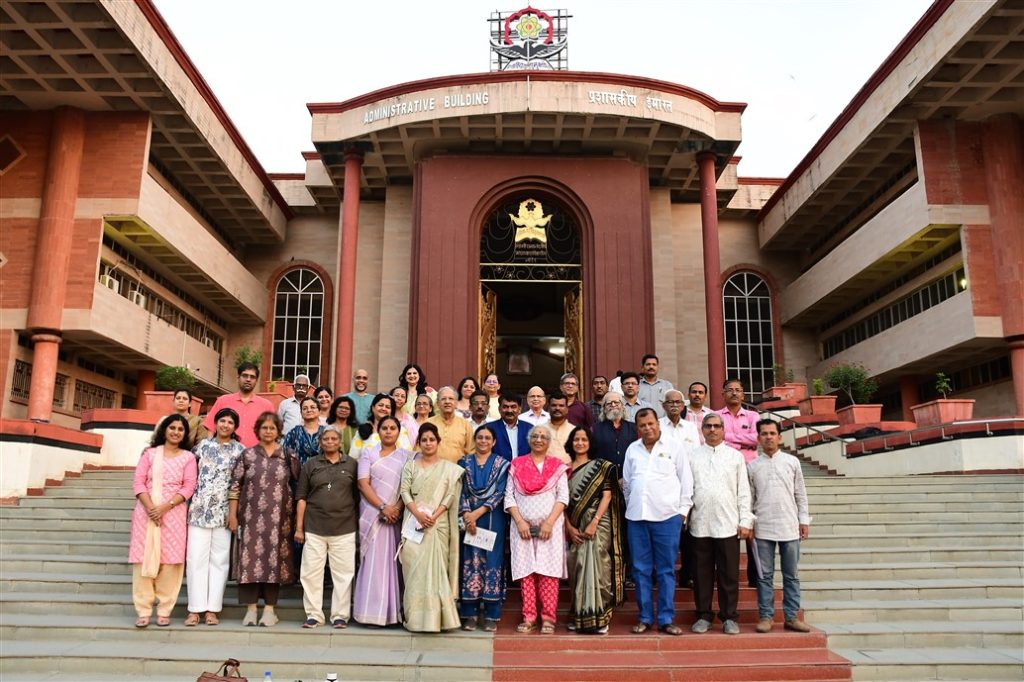 The easiest way to bring the world closer is to become a translator. A translator not only bridges the gap between two languages, but also builds a bridge between two cultures. Translation also bridges the gap between two different times. The opportunities for translation have increased exponentially in the new world. As the world has become closer and people from one country have to move to foreign lands for education, trade, employment, industry and other reasons. Learning the language of a new land has become a necessity for daily needs.
The easiest way to bring the world closer is to become a translator. A translator not only bridges the gap between two languages, but also builds a bridge between two cultures. Translation also bridges the gap between two different times. The opportunities for translation have increased exponentially in the new world. As the world has become closer and people from one country have to move to foreign lands for education, trade, employment, industry and other reasons. Learning the language of a new land has become a necessity for daily needs.
The revolution in communication has created hundreds of opportunities for tourism. The tourism business needs good interpreters. A.I. and machine translation have brought about revolutionary changes in the field of translation. Therefore, the need for translation studies as a branch of knowledge is increasing day by day all over the world.
Keeping this in mind, Swami Ramanand Teerth Marathwada University in Nanded, India organized an All India Translated Marathi Literature Festival (Akhil Bhartiy Anuwadit Marathi Sahitya Sammelan) on March 22nd and 23rd.
Despite the phrase “All India” in the title of the Festival, the 65 translators included translators proficient in languages such as Spanish, French, Arabic, and English.
The 3rd All India Translated Marathi Literature Festival was organized jointly by the School of Language, Literature and Culture Studies, Shri Gurugobind Singhji Chair of Swami Ramanand Teertha Marathwada University and Sahitya Bharati, Akhil Bharatiya Sahitya Parishad.
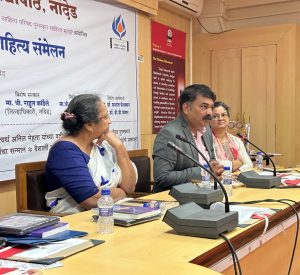 The conference was inaugurated by Vice Chancellor Dr. Manohar Chaskar. Renowned translator Ravindra Gurjar was the chairman. Management Council Member Shri. Narendra Chavan was present at the inauguration ceremony.
The conference was inaugurated by Vice Chancellor Dr. Manohar Chaskar. Renowned translator Ravindra Gurjar was the chairman. Management Council Member Shri. Narendra Chavan was present at the inauguration ceremony.
Translator and well-known writer Dr. Shirish Sahasrabudhe and poet Laxmikant Tamboli were specially honored at the Lit-Fest. 14 translated books published by Vaishali Publication, Nashik were released. Vaishali Prakashan has decided to publish Marathi translations of a total of one hundred world books by December 2025.
Language should be useful for living; the new generation should come forward to make language the language of knowledge. This was the appeal made by Vice Chancellor Dr. Manohar Chaskar while inaugurating the Festival.
The special dialogue ‘Me and Translation’, chaired by Bhagwant Kshirsagar, was moderated by Manoj Borgaonkar and Shirish Sahastrabudhe. Shamrao Joshi delivered a special lecture on ‘Translations: Libraries, Readers’ Taste and the Future of Printed Books’. Shamrao Joshi is associated with the library movement in Mumbai, he has set up six libraries with more than one lakh books in the Badlapur area of Mumbai.
To understand what kind of translations do publishers need? What is the market demand? And what are the expectations of translators from publishers? The festival organized an author-publisher discussion in line with the culture of translation. Vilas Potdar, Parag Lonkar, Tanuja Shah, Aditya Hardikar, Jayshree Bokil, Ram Tarte, Sunil Karmarkar participated in this discussion.
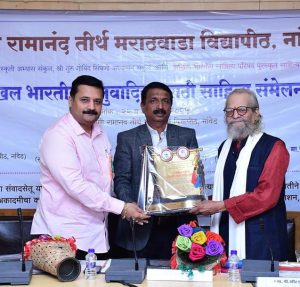 The advancement in the internet and technology has also transformed the field of translation. A discussion was held under the chairmanship of Tejali Shahsane on AI, machine translation, and the future of interpreters. Supriya Godbole, Suchita Phadke, Narayan Harlikar, Saili Dhongde, Darshika Somayya, Amrapali Bhadre, M.E. Tangwar participated in this discussion. Prithviraj Taur, Eknath Dumane, Shivaji Ambulgekar, Surashree Joshi, Anagha Natekar, and Ravindra Abhyankar participated in the session on ‘Reading Translated Literature’ chaired by Shuchita Nandapurkar Fadke.
The advancement in the internet and technology has also transformed the field of translation. A discussion was held under the chairmanship of Tejali Shahsane on AI, machine translation, and the future of interpreters. Supriya Godbole, Suchita Phadke, Narayan Harlikar, Saili Dhongde, Darshika Somayya, Amrapali Bhadre, M.E. Tangwar participated in this discussion. Prithviraj Taur, Eknath Dumane, Shivaji Ambulgekar, Surashree Joshi, Anagha Natekar, and Ravindra Abhyankar participated in the session on ‘Reading Translated Literature’ chaired by Shuchita Nandapurkar Fadke.
Keeping in mind the needs of the new world, it is necessary to implement translation courses at the university and college levels. It is necessary to provide employment to the new generation. A discussion on Translation Studies courses was held under the chairmanship of Dr. Shirish Sahasrabuddhe. Dakshayani Pandit, Devidas Phulari, Sampada Patgaonkar, Sheetal Kokate, Nilesh Londhe, Rohini Joshi, Anita Dane, Datta Badure, Kailash Yadav, and Nina Gogate expressed their views in this session.
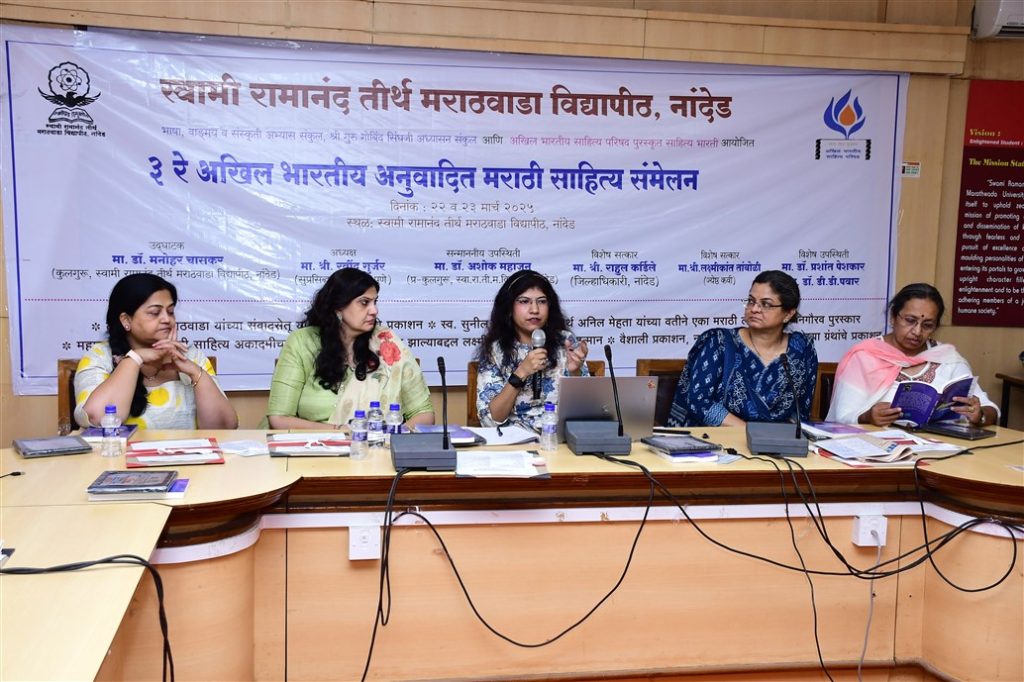 Under the chairmanship of Yashshree Punekar, a discussion was held on the contribution of translation to the growth of the Marathi language. Vikas Satam, Mandar Joshi, P. S. Kathle, Bapu Dasari participated in this discussion.
Under the chairmanship of Yashshree Punekar, a discussion was held on the contribution of translation to the growth of the Marathi language. Vikas Satam, Mandar Joshi, P. S. Kathle, Bapu Dasari participated in this discussion.
Ratnakar Rege and Ravindra Bembre moderated the discussion chaired by Vijayalakshmi Revankar. The discussions focused on the translation of Marathi literary works into other languages.
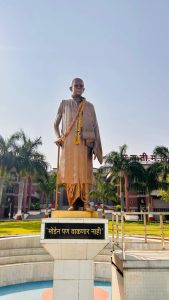
The closing ceremony was graced by the presence of Dr. Chandrakant Baviskar, Dean of the Inter-Disciplinary Faculty, as the chief guest. An open session was held under the chairmanship of Ravindra Gurjar. A total of 17 resolutions were passed in the closing ceremony. It was demanded that translation studies should be included in the school curriculum as well, and that separate library hours should be provided in schools.
On the first day of the Lit Fest.
in the evening, the invited translators visited Sachkhand Gurudwara and had darshan. Translators were honored on behalf of the Gurudwara. Media expert Dr. Deepak Shinde was present on this occasion.
It is hoped that this Literature festival will create new translators. Various publishers undertook translation projects with the translators.
The 3rd All India Translated Marathi Literature Festival organized at Swami Ramanand Teertha Marathwada University was the first of its kind. Dr. Prithviraj Taur, Dr. Shailaja Wadikar, Dr. Nina Gogate took the initiative to organize the Lit Fest. All three of them, as translators, provide exchange of Marathi literature in Hindi, English and French. Everyone expressed the feeling that this festival would strengthen the translation culture in Marathi and Indian Languages

